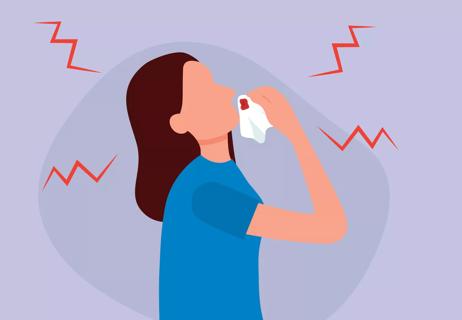Allergies, acid reflux and even pregnancy can increase drainage and upset your stomach

Most of us choose not to spend our days contemplating our mucus. But every once in a while, we have no choice but to recognize the truth: We’re basically walking, talking goo factories. It’s particularly unavoidable when you’re experiencing postnasal drip, and all that gunk from your nose or sinuses drains down the back of your throat.
Advertisement
Cleveland Clinic is a non-profit academic medical center. Advertising on our site helps support our mission. We do not endorse non-Cleveland Clinic products or services. Policy
You’ve probably heard of the term “postnasal drip.” But what exactly is it, and can it make you sick to your stomach? We asked family physician Simon Hodes, MB ChB. He explains the relationship between postnasal drip and nausea, how to address it in the moment and when it’s time to see your healthcare provider.
Our mouths, throats and sinuses produce a lot of mucus to keep things moist and protect against bugs and irritants. We’re talking one to two liters of the stuff a day. We make about the same amount of saliva in a day, too.
“The mucus and saliva our body generates drains from our nose, mouth and sinuses into our throat, helping to lubricate it,” Dr. Hodes explains. Drainage is a good thing, and — on a good day — the mucus mixes with your saliva and you swallow it without realizing you’re doing it.
“Normal throat drainage does not make us feel queasy, in fact, you typically don’t notice it at all,” he continues. But that can change if the amount of drainage increases and starts to drip down the back of your nose — hence the term “postnasal drip.”
Mucus drainage is crucial to our health, but it can make us nauseated when we have conditions that increase throat drainage, causing postnasal drip.
Advertisement
You may end up with a mucus-induced crummy tummy if you:
But conditions that increase drainage aren’t the only reason throat drainage could bother your stomach.
“What’s often overlooked is that conditions that inflame or irritate the throat can also make us aware of normal drainage,” Dr. Hodes clarifies. “If swallowing food or drink becomes difficult, drainage can take longer to go down, which can bother your stomach.”
Common causes of throat irritation and inflammation include:
Dr. Hodes also points out that certain medications — like the antihistamines you take when you’re feeling drippy — can change the character of our drainage, heightening our awareness of it. That’s right: Treating your postnasal drip may be counterproductive and make you more nauseated. Ironic.
As you can probably tell, it can be hard to determine the underlying cause of postnasal drip-induced nausea. Is postnasal drip really what’s causing your nausea or is throat irritation from an underlying condition making typical drainage feel … well, gross?
There’s good news. Not having a cause or treatment plan pinned down doesn’t mean you can’t treat your symptoms. You can. Dr. Hodes walks us through some home remedies that are worth considering.
Advertisement
“If you’re experiencing nausea, you should see your primary care provider,” Dr. Hodes advises. “They can help determine the cause of your nausea and, if necessary, refer you to an ear, nose and throat specialist.”
Most of the time, postnasal drip-induced nausea and vomiting, while unpleasant and inconvenient, aren’t the kind of things you need to be seen for the same day. But there are exceptions to every rule. Contact a provider promptly if you:
“Postnasal drip” is the term we use for an overproduction of mucus that drains down the back of your throat. That additional drainage can bother your stomach, causing nausea and vomiting. Sometimes, you actually don’t have postnasal drip, but throat irritation or inflammation makes you more sensitive to (and queasy over) the drainage process.
Remember, if you’re experiencing postnasal nausea, lots of home remedies can potentially help. The key things to think about are staying hydrated, opening up your nasal passages and limiting foods or other triggers that promote irritation or mucus production.
Advertisement

Sign up for our Health Essentials emails for expert guidance on nutrition, fitness, sleep, skin care and more.
Learn more about our editorial process.
Advertisement

If your nose is constantly running, it could be allergies, chronic sinusitis, nasal polyps or other concerns

Allergies, indigestion and the effects of gravity can all mess with your nose at night

Staying calm, sitting up straight and gently pinching the sides of your nostrils can help a bloody nose go away faster

Dry air, allergies or nose-picking may be to blame for nighttime epistaxis

Take care of your runny or stuffy nose by staying hydrated, using a humidifier and considering a medication

Seek help if bleeding doesn’t stop or they’re interfering with your life

It’s usually the way your nose manages airflow, but sometimes, it could be other issues

Correct positioning is one of the keys to getting the best results

Even small moments of time outdoors can help reduce stress, boost mood and restore a sense of calm

A correct prescription helps your eyes see clearly — but as natural changes occur, you may need stronger or different eyeglasses

Both are medical emergencies, but they are very distinct events with different causes